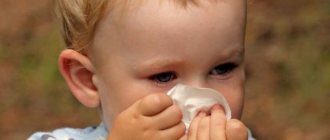Persistent cough is a common problem in pediatrics.
Therapy for such a disease in most cases differs in duration and the need for a multi-stage examination of the child.
The causes of a lingering cough in a child may not be associated with pathological processes in the respiratory system, but may be a symptom of diseases of other vital systems of the body. It is imperative to find out the factors that provoke regular attacks.
General concept
In medical practice, a prolonged cough is a cough that persists for two or three weeks .
The intensity of the attacks may vary.
The cough can be dry, wet, resemble respiratory spasms, or have a mild form in which the child coughs regularly .
Attacks can occur at a certain time (in the morning, at night) or occur suddenly. Each form of persistent cough is provoked by certain factors and requires treatment with specific drugs or procedures.
Causes
A lingering cough can be provoked by various factors, which include not only respiratory diseases. In some cases, an attack is a specific reaction of the baby’s body to the negative impact of the environment .
For example, if a child often lives in unsanitary conditions, then the accumulation of dust on the mucous membranes will provoke frequent coughing.
No respiratory pathologies will be detected. factors can provoke a persistent cough in a child :
- relapse of a recent illness;
- constant exposure to dust, tobacco smoke or other irritants on the mucous membranes of the respiratory system;
- complications after viral, bacterial, infectious or respiratory diseases;
- allergic reaction of the child’s body to certain irritants;
- ingestion of foreign objects into the respiratory system (provided the symptoms are ignored and the particle remains in the respiratory system);
- consequences of severe stressful situations or other emotional shocks;
- increased sensitivity of the bronchial walls to external factors (including irritants);
- uncontrolled use of potent drugs (or their use for other purposes);
- negative impact of an environmentally unfavorable atmosphere;
- inflammatory processes in the sinuses;
- progression of laryngeal swelling (can be caused by internal or external factors);
- chronic diseases of the cardiovascular system;
- infection of the digestive tract by bacteria;
- regular hypothermia of the child’s body.
What can a child’s cough in the morning indicate? Find out about this from our article.
Causes of uncontrollable cough
Cough until vomiting: possible causes
If a child coughs to the point of vomiting, and the parents don’t know what to do, the first thing to do is check to see if the child is choking. Sometimes such a cough is triggered by small crumbs, droplets of liquid, or even an unsuccessfully “captured” portion of air entering the trachea.
Since the baby’s respiratory and vomiting functions are not yet well formed, and similar centers are very close, irritation of the respiratory organs can cause a strong, paroxysmal cough. The body instinctively strives to push out the source of irritation, and a hysterical cough easily provokes vomiting. After the foreign body leaves the larynx, the cough will go away and along with it, vomiting. It is a completely different matter if the cough is caused by an infection or acute inflammatory process.
In this case, attacks of vomiting may occur repeatedly, and this is very dangerous, especially if the child is very small.
Such a baby may accidentally inhale or choke on vomit. If this happens in the absence of adults, the consequences can be dire.
The most common causes of cough with vomiting are the following sources and diseases:
- Dry cough caused by a variety of factors. With a non-productive (dry) cough, the child produces too little sputum, it is thick and very viscous, so the baby cannot clear his throat, attacks literally turn him inside out, and the spastic state of the muscles easily leads to vomiting.
- Wet cough in various diseases. With a productive cough, the baby literally chokes on his own phlegm, and if he is still small and does not know how to cough it up and spit it out, its entry into the esophagus and stomach can cause vomiting.
- Severe runny nose, accompanied by copious mucus discharge. The same thing happens with a runny nose with a huge amount of mucus. It flows down the back wall of the throat and irritates it greatly, causing a cough and followed by a gag reflex.
- Inflammatory and infectious diseases of the throat. If a child has a sore throat, accompanied by high dryness, irritation and inflammation of the mucous membranes, then this can also easily cause a severe cough. If it continues for a long time, it can quickly provoke vomiting, since spastic suffocation causes muscle contraction, stimulating the stomach to erupt its contents.
- Whooping cough. With whooping cough, a barking, dry cough followed by vomiting is one of the clearest signs of the disease. If such symptoms appear, parents should immediately take emergency measures and immediately seek help from specialists.
Is a wet cough in a baby without fever normal or pathological?
What to do during coughing attacks
Cough until vomiting: first aid and treatment methods
In most cases, when a child coughs to the point of vomiting, and the parents do not know what to do, it is necessary to eliminate the irritation and pacify the attack.
Since cough can be a symptom of a variety of diseases - from the simplest cold to serious infections, self-medication and uncontrolled use of serious medications, especially antibiotics, are extremely risky. At home, responsible parents can use only safe and proven products, but under no circumstances put the health and even the life of their baby at risk by giving him medications without a doctor’s prescription.
Inhalation is a safe and at the same time very effective means.
- Like inhaling hot steam in the bathroom, it is aimed at expanding the bronchi, relieving an attack of suffocation and easier and faster release of accumulated phlegm. Using inhalation, you can relieve inflammation and improve blood circulation, which will help reduce or stop coughing. If he doesn’t exist, the attacks of vomiting that accompanied suffocation will also become a thing of the past.
- For very young children, it is best to use a nebulizer and alkaline mineral water. This is the safest and gentlest method of treatment, which is well tolerated by babies and does not cause any particular inconvenience to parents. If the child tolerates herbs well and does not suffer from various types of allergic reactions, inhalations with eucalyptus, chamomile, mint and other medicinal plants can be performed.
- To tame a cough with vomiting, you can use a very old but effective method - inhaling water with soda or inhaling steam from boiled potatoes. The latter remedy has been tested for decades and works well for coughs accompanied by a runny nose. Hot steam warms up both the bronchi and nasopharynx, helping to actively free them from accumulated phlegm and mucus. The faster they clear, the sooner the cough will go away and there will be no urge to vomit. When inhaling potato fumes, the boiled tubers can be sprinkled with soda powder, this will only enhance the effect.
Useful video on how to relieve a coughing attack in a child.
How to treat an incipient cough in a child: effective methods and prevention
If the child is old enough, and the parents have already treated him with similar drugs and the doctor prescribed them, you can give him antitussives designed specifically for his age. For a dry cough, you need to give drugs that have an antispasmodic and mucolytic effect, that is, they stop a coughing attack and increase the secretion of sputum and its dilution.
For a productive cough, medications should help clear the throat and produce sputum to clear the airways.
Whooping cough can only be treated by a doctor, prescribing specific medications, including antibiotics.
Since a cough is just a symptom of an underlying disease, all attention should be paid to identifying and treating the cause of the disease. By eliminating the source of the cough, parents will quickly cope with it and its unpleasant consequences in the form of bouts of vomiting.
Consequences of improper treatment
Possible complications
When a child coughs to the point of vomiting, and the parents don’t know what to do, the main and primary action is to calm the baby and calm down themselves. If you panic, this condition can be transmitted to an already frightened child. The most dangerous thing can happen - the baby can choke on vomit. This can already have a variety of consequences, even critical ones.
Do not try to treat your child’s cough on your own, especially if we are talking about an infant or a child in the first years of life. By independently “prescribing” him medications, you can cause irreparable harm to his health. Antibiotics are especially risky in this regard. Their role is often overestimated and considered almost a panacea for various diseases. But they can easily cause serious problems, especially with digestion. In a small child, the body is still developing its defenses, including a “set” of beneficial microorganisms, beneficial microflora, which in the future will be able to independently fight certain pathogens. The baby’s immunity is still very weak, so unreasonably aggressive use of antibiotics will not only not help, but can also cause various diseases, the most dangerous of which can be dysbacteriosis.
Other medications can also cause serious harm; most often, allergic reactions are the consequence of such ill-considered treatment.
A child with hypersensitivity may react to some drugs with angioedema and anaphylactic shock, and this is a direct threat to life.
If parents do not consult a doctor and try to cope with the problem only with home remedies, other consequences are possible, for example, the transition of an acute disease to a chronic form. This will also be detrimental to the child's health and may affect his development. Timely adoption of urgent correct measures and prompt seeking of medical help can quickly cope with a cough and eliminate the accompanying vomiting in a child.
What to give a child for a dry cough: drug therapy and traditional methods
What diseases can it cause?
In most cases, a lingering cough in children is a consequence of improper or inadequate treatment of acute respiratory infections, acute respiratory viral infections, influenza and other diseases of this type. In this case, there is a risk of developing chronic bronchitis.
However, this factor is not the only cause of a lingering cough.
Some diseases are distinguished by similar symptoms due to their specificity and significant damage to the respiratory system.
Restoration of the condition of the mucous membranes occurs at a slow pace, which is why attacks can persist not only for several weeks, but also for months.
diseases can provoke a prolonged cough in a child :
- gastroesophageal reflux;
- bronchial asthma;
- intestinal infections;
- otitis;
- pharyngitis;
- laryngitis;
- tuberculosis;
- tracheitis;
- bronchitis;
- sinusitis;
- whooping cough.
What can he talk about?
The form of a prolonged cough does not always allow diagnosing an existing disease in a child without special tests in a medical institution.
However, based on the type of attacks, one can draw conclusions about the presence of deviations in a certain system of the baby’s body and determine the necessary course of treatment.
All drugs for the treatment of cough are divided into several categories (for dry, wet, allergic type).
Causes of lingering cough of various forms:
- Dry cough (coughing attacks without signs of sputum production may be symptoms of relapse or progression of an existing disease; such a sign is accompanied by pathologies of the cardiovascular system, digestive tract, foreign objects entering the respiratory system or an allergic reaction to certain irritants).
- A wet cough in most cases indicates the child’s recovery process after an illness, but if its attacks persist for a long time, there is a risk of bronchial asthma or diseases associated with inflammatory processes of the nasal sinuses or respiratory organs (sinusitis, sinusitis, bronchitis, adenoid hypertrophy, etc. .).
- A lingering cough may be accompanied by fever or occur without such a symptom (an increase in body temperature in a child always indicates the presence of an inflammatory process in the body; a lingering cough in combination with such a symptom in most cases is a sign of a complication of acute respiratory infections, ARVI, influenza, infectious diseases, the absence of fever may indicate the negative impact of external factors, bronchial asthma, chronic respiratory diseases).
Read about the symptoms and treatment of allergic bronchitis in children here.
Causes of cough without fever
In the human body, cough performs certain protective functions. With the help of the cough reflex, the airways are cleared of foreign particles entering during inhalation and a mixture of lumps of mucus and dust.
A cough does not necessarily indicate illness and is considered a normal physiological process. Before starting treatment, the cause must be established. Often small particles in the form of food crumbs and other loose objects get into the baby's larynx or trachea. In such cases, the cough becomes prolonged until the irritants are completely removed from the respiratory tract.
Often, a child, while exploring the world around him, may unknowingly put small objects in his mouth in the form of beads, plastic peas and toy parts. This situation is characterized by the sudden appearance of a cough in a healthy baby. There are no cold symptoms, the victim is short of breath, the complexion becomes pale or blue.
In the absence of fever, a prolonged, dry cough may appear as a consequence of allergic reactions. It occurs in response to irritants that are allergens. At the same time, nasal congestion occurs, tears flow from the eyes, and the skin turns red. If such reactions occur regularly, you should definitely consult a doctor. Untimely treatment leads to chronic bronchitis and bronchial asthma.
Diagnostics
Determining the causes of persistent cough in children is carried out in several stages. First, the specialist must collect anamnesis and determine the general health of the child (visual examination and laboratory tests).
A thorough examination of the respiratory system is then carried out . Additionally, consultations with specialized specialists and procedures for identifying pathologies of the digestive or cardiovascular system may be prescribed.
- consultation with a pediatrician, gastroenterologist, ENT doctor and allergist;
- laboratory examination of sputum;
- allergy tests;
- bronchoscopy;
- general blood and urine analysis;
- CT and MRI of the chest;
- biochemical analysis of blood and urine;
- chest x-ray.
How to help your baby?
Bouts of prolonged coughing can be accompanied by significant discomfort for the child and resemble bronchospasms .
If the baby has difficulty breathing and cannot clear his throat, then it is necessary not only to consult a doctor, but also to provide first aid to the child to alleviate his condition.
The baby should be allowed to drink water or other liquids only after the attack has resolved. Otherwise, he may choke.
If you have a persistent cough, you should take the following measures:
- During an attack, it is necessary to provide a flow of fresh air (the child’s room should be regularly ventilated).
- You can eliminate the cough by lightly tapping the child’s chest area or applying pressure (this technique helps speed up the process of mucus discharge).
- Between coughing attacks, the child should be given as much fluid as possible (water and all drinks should be warm).
Wet cough in a child without fever
A child's cough without fever can be either dry or wet. When coughing, mucus is released that has accumulated in the bronchi. It gets there during a runny nose, when mucus from the nose flows down the throat, causing a wet cough. Coughing is a natural physiological process that does not require treatment. In this situation, you need to fight not a cough, but a runny nose. In all cases, treatment measures are carried out only after identifying the cause of the cough.
How to treat a wet cough without fever
During a wet cough, only expectorants are prescribed. The use of cough suppressants is not allowed. For expectoration, it is taken ambroxol, lazolvan, bromhexine, pectusin, licorice root syrup and other similar medications. Other drugs that suppress the cough reflex can only worsen your health and cause complications of the lower respiratory tract.
Should you see a doctor?
A persistent cough in a child should never be ignored .
Without special treatment, its symptoms may not go away on their own.
If therapy is carried out incorrectly or completely excluded, the risk of complications increases several times.
A visit to the doctor should not be postponed if the cough persists for more than two weeks. Experts identify several factors in the presence of which it is necessary to examine the child as soon as possible.
Be sure to consult a doctor in the following cases:
- attacks of dry cough cause a child to vomit or provoke a change in the color of his face;
- cough occurs mainly at night and significantly disrupts the child’s sleep;
- the child’s body temperature rises;
- dark shade of urine and disruption of the urination process;
- there is excessive dryness of the skin and mucous membranes;
- Coughing attacks are accompanied by signs of lack of oxygen.
Dry cough in a child without fever
A cough is considered dry when no sputum or mucus is produced during attacks. The child experiences pain and other unpleasant sensations. The purpose of treatment in such cases depends on the reasons why this pathology appeared. The difficulty is treating a dry cough without increasing the temperature.
Often a dry cough occurs as a result of allergic reactions, inflammatory processes, exposure to dust, and smoking of surrounding people. In some cases, medications are not needed, but in other situations they cannot be avoided. A common cause is considered to be colds caused by viral infections and occurring without fever. Such diseases begin with mild irritation or sore throat, gradually developing into a dry cough. As a result of treatment, after some time it becomes moist and gradually goes away. The same symptoms appear in the presence of the influenza virus, in which the child’s well-being significantly worsens.
Treatment
How to treat the disease? Treatment for a persistent cough directly depends on its form. The doctor should select medications and prescribe additional procedures based on the results of the examination of the small patient.
If you change medications yourself and use the wrong versions, the child’s condition can only worsen.
All antitussive medications have certain properties and are used in the treatment of specific forms of cough (dry, wet, bronchospasms, etc.).
Medicines for children from 0 years old
When choosing drugs for the treatment of persistent cough, the age of the child plays an important role.
Some medications are approved for use in the treatment of children from birth , others - after reaching a certain age.
You cannot violate manufacturers' recommendations, but in some cases experts make exceptions (there must be serious reasons for this).
- antitussive drugs (Sinekod, Panatus);
- expectorants (Prospan, Gedelix);
- mucolytics (Ambroxol, Bromhexine, Ambrobene, ACC);
- drugs to block the cough reflex (Robitussin);
- antiviral drugs (Viferon);
- antipyretics if necessary (Ibuprofen, Nurofen, Paracetamol);
- nasal drops to eliminate the accumulation of mucus that provokes coughing (Aquamaris, Nazol baby);
- drugs intended for the treatment of persistent cough (Pertussin, Pectussin).
Inhalations
Inhalation for the treatment of persistent cough in children can be carried out in several ways. The simplest and most effective method is to attend special procedures in a medical facility .
A good alternative to this method is to purchase a nebulizer for home use.
If it is not possible to use such methods, inhalation can be carried out using a structure made from a saucepan and a towel (the child must inhale the steam of the decoction).
For inhalation against prolonged cough in children, the following compositions can be used :
- decoctions of sage, St. John's wort, coltsfoot, calendula, chamomile or linden;
- medications (Ambrobene, Sinupret, Lazolvan);
- essential oil of pine or eucalyptus;
- healing mineral waters.
Folk remedies
How to cure a persistent cough in a child using folk remedies? Alternative medicine recipes have proven to be effective against persistent coughs in children.
Some of them have the ability to quickly act on the mucous membranes of the respiratory system and prevent attacks.
Supplementing the main therapy with such methods will speed up the child’s recovery process and will have a beneficial effect on the state of his immune system.
Examples of folk remedies for treating persistent cough in children:
- Honey, sugar and onions (to prepare the product you will need as much chopped onions as possible, all ingredients must be mixed in equal proportions, the child should take the resulting mixture a teaspoon several times a day, it is allowed to wash it down with a small amount of water).
- Chamomile decoction (pour a teaspoon of dry raw material into a glass of boiling water and leave for twenty minutes, give the remedy to the child in small portions throughout the day).
- Raisin infusion (pour a tablespoon of raisins into a glass of boiling water, leave for fifteen minutes and give to the child throughout the day).
- Banana puree (mash banana pulp, add a small amount of hot water, the consistency of the product should resemble puree, it is recommended to take the product several times a day in small portions).










